

The 8 Mobile App Metrics That Matter. Nearly 22% of apps downloaded are never used more than once.
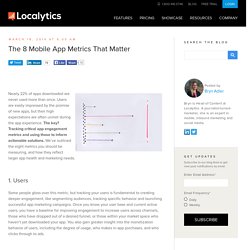
Users are easily impressed by the promise of new apps, but their high expectations are often unmet during the app experience. The key? Tracking critical app engagement metrics and using those to inform actionable solutions. We’ve outlined the eight metrics you should be measuring, and how they reflect larger app health and marketing needs. 1. Some people gloss over this metric, but tracking your users is fundamental to creating deeper engagement, like segmenting audiences, tracking specific behavior and launching successful app marketing campaigns. 2. Session length is measured as the period of time between app open and close, or when the app times out after 15 seconds.
Tracking the length of user sessions is critical to unlocking revenue potential in your app flows. 3. Session interval is the time between the user’s first session and his or her next one, showing the frequency with which your users open the app. 4 In-App KPIs Mobile Marketers Can't Ignore. Getting a user to commit to downloading your mobile app is only half the battle – to build a large, engaged, user base, you then need to make sure every aspect of the app experience is optimized and lives up to expectations.
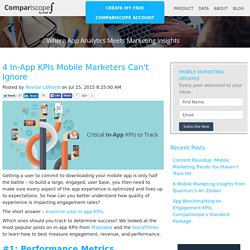
So how can you better understand how quality of experience is impacting engagement rates? The short answer – examine your in-app KPIs. Which ones should you track to determine success? Top 12 Key Performance Indicators for Maximizing Mobile App Revenue. Though many mobile marketers still focus on getting their app installed – which is certainly more of a challenge than it was in the much less crowded app stores many years ago – the install is only the beginning of the mobile customer journey, even for the small percentage of paid apps.
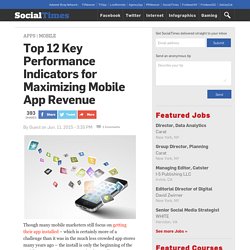
Mobile customer engagement is the future of marketing, and the app install is the opening sprint of this marathon. So what Key Performance Indicators (KPIs) should marketers look for in order to gauge performance on mobile? Though there is no ‘one size fits all’ solution for mobile marketers, after more than a decade in mobile marketing, here are my top 12 KPIs for bringing users through the funnel.
Engagement Metrics – The first three metrics focus on how engaged your customers are with your app. 1. 2. 3. 4. For example, for a retail application, we saw that page views (and not sales or placed items in shopping carts) was the KPI which provided the best indication to lifetime customer value. 5. 6. 9 Mobile App KPIs to Know. Carl asks, What metrics are most important to my mobile app business?
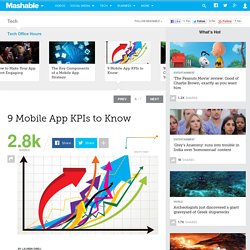
Great question, Carl — this is both an easy and difficult question to answer. There isn't a one-size-fits-all set of key performance indicators (KPIs), but what follows is a primer that will provide a few things to think about. Obviously downloads are a key metric for any app provider, but the number means nothing without context. "Downloads only enable an app to succeed, they do not indicate actual success," says Brant DeBow, EVP of technology at BiTE Interactive. App Strategy Apps present a unique opportunity for brands, and they should not be treated as an app version of the website. When you start thinking about "stickiness," you realize how much app usage trumps app downloads, as usage suggests enjoyment, utility and value.
16 Startup Metrics. We have the privilege of meeting with thousands of entrepreneurs every year, and in the course of those discussions are presented with all kinds of numbers, measures, and metrics that illustrate the promise and health of a particular company.
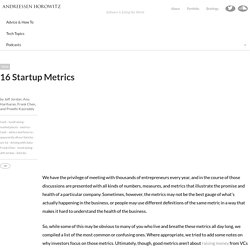
Sometimes, however, the metrics may not be the best gauge of what’s actually happening in the business, or people may use different definitions of the same metric in a way that makes it hard to understand the health of the business. So, while some of this may be obvious to many of you who live and breathe these metrics all day long, we compiled a list of the most common or confusing ones. Where appropriate, we tried to add some notes on why investors focus on those metrics. Ultimately, though, good metrics aren’t about raising money from VCs — they’re about running the business in a way where founders know how and why certain things are working (or not) … and can address or adjust accordingly. Business and Financial Metrics #1 Bookings vs. . #11 Churn. 16 Startup Metrics.